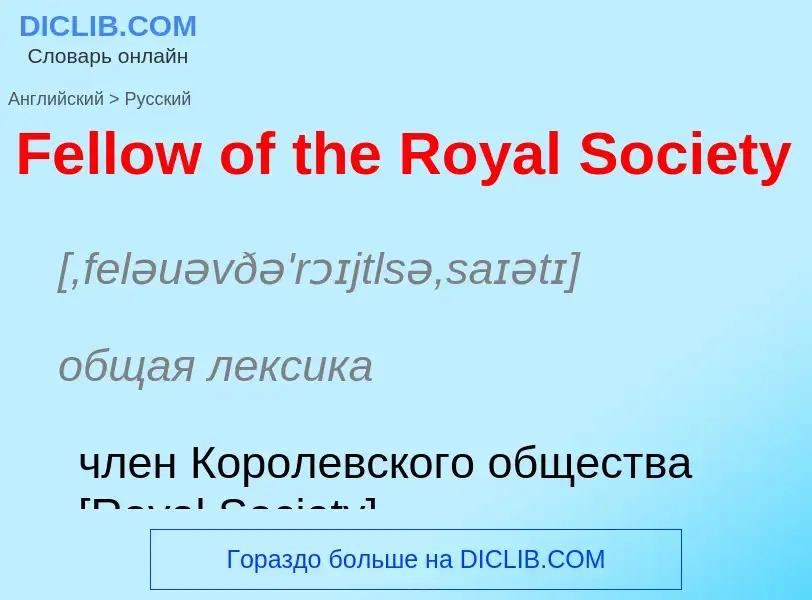Translation and analysis of words by ChatGPT artificial intelligence
On this page you can get a detailed analysis of a word or phrase, produced by the best artificial intelligence technology to date:
- how the word is used
- frequency of use
- it is used more often in oral or written speech
- word translation options
- usage examples (several phrases with translation)
- etymology
Fellow of the Royal Society - translation to English
[,feləuəvðə'rɔɪjtlsə,saɪətɪ]
общая лексика
член Королевского общества [Royal Society]
[,rɔɪtlsə,saɪətɪəv'lɪttrɪtʃə]
общая лексика
Королевское общество литературы (издаёт литературоведческие труды и присуждает премии и почётные звания за произведения всех жанров, в т.ч. за работы в области поэзии и критические труды; его патроном был Георг IV [George IV]. Основано в 1823)
Definition
Wikipedia

Fellowship of the Royal Society (FRS, ForMemRS and HonFRS) is an award granted by the Fellows of the Royal Society of London to individuals who have made a "substantial contribution to the improvement of natural knowledge, including mathematics, engineering science, and medical science".
Fellowship of the Society, the oldest known scientific academy in continuous existence, is a significant honour. It has been awarded to many eminent scientists throughout history, including Isaac Newton (1672), Michael Faraday (1824), Charles Darwin (1839), Ernest Rutherford (1903), Srinivasa Ramanujan (1918), Albert Einstein (1921), Paul Dirac (1930), Winston Churchill (1941), Subrahmanyan Chandrasekhar (1944), Dorothy Hodgkin (1947), Alan Turing (1951), Lise Meitner (1955) and Francis Crick (1959). More recently, fellowship has been awarded to Stephen Hawking (1974), David Attenborough (1983), Tim Hunt (1991), Elizabeth Blackburn (1992), Raghunath Mashelkar (1998), Tim Berners-Lee (2001), Venki Ramakrishnan (2003), Atta-ur-Rahman (2006), Andre Geim (2007), James Dyson (2015), Ajay Kumar Sood (2015), Subhash Khot (2017) and around 8,000 others in total, including over 280 Nobel Laureates since 1900. As of October 2018, there are approximately 1,689 living Fellows, Foreign and Honorary Members, of whom 85 are Nobel Laureates.
Fellowship of the Royal Society has been described by The Guardian as "the equivalent of a lifetime achievement Oscar" with several institutions celebrating their announcement each year.


![[[David Attenborough]] was elected a fellow in 1983, under former statute 12 [[David Attenborough]] was elected a fellow in 1983, under former statute 12](https://commons.wikimedia.org/wiki/Special:FilePath/Sir David Frederick Attenborough at Weston Library Opening 20.3.15 (cropped).jpg?width=200)
